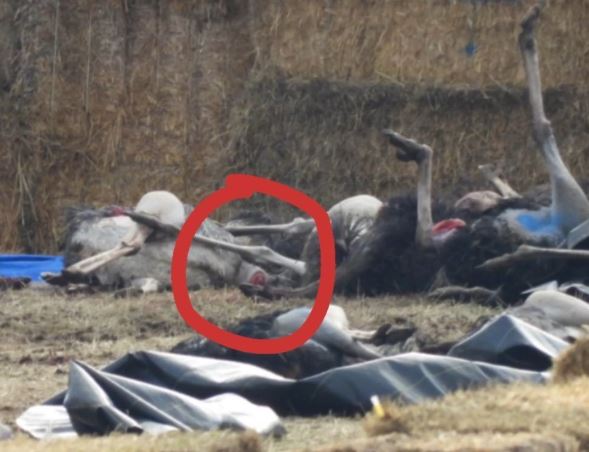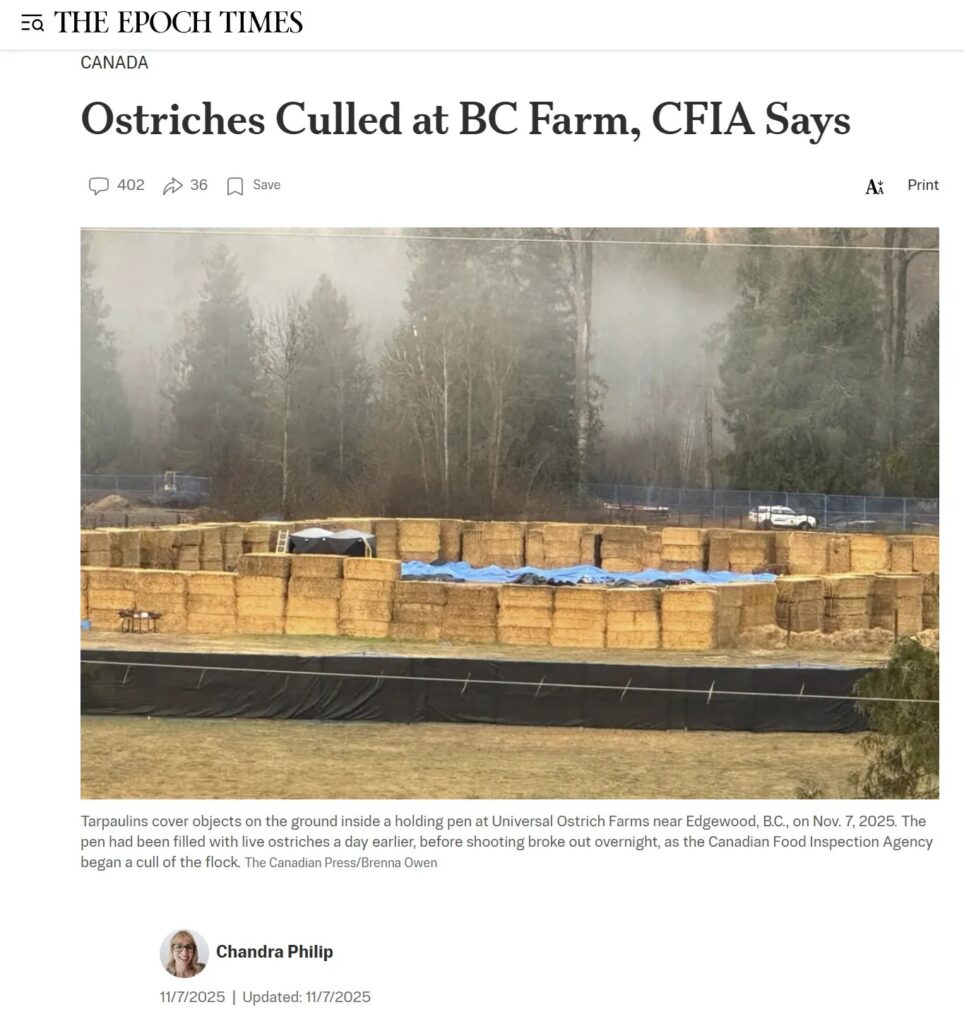View RCMP Officers Who Attended the Farm | View the 9 Supreme Court of Canada Justices | Dr. Byram W. Bridle Comments on the Culling | Government of Canada Purchases Avian Influenza Vaccine | WEF One Health Approach | US Businessman John Catsimatidis Speaks Up
$50,000 Reward: Whistleblowers Wanted in CFIA/RCMP Ostrich Massacre
Ostriches are NOT poultry.
They fall under ratites, not Galliformes or Anseriformes — and therefore do NOT fall under poultry culling regulations.
Yet CFIA used poultry regulations to justify the slaughter of over 400 ostriches.
🔹 WOAH (World Organisation for Animal Health) says ratites ≠ poultry
🔹 Culling is a last resort only for infected birds
🔹 Quarantine is allowed for 21+ days to 12 months
🔹 Slaughter must be via gas or captive bolt — NOT gunfire
🔹 CFIA ignored all international and Canadian standards
Now a $50,000 whistleblower reward has been offered for anyone inside CFIA or RCMP who provides evidence leading to prosecution.
Universal Ostrich Farms: Animal Justice Canada: Legal Complaint Filed Over Mass-Shooting
Our Mission
Animal Justice is Canada’s only national animal law advocacy organization.
We believe that animals need lawyers, and our legal team works to protect animals from cruelty and neglect. Canada has some of the worst animal protection laws in the Western world, and our mission is to overhaul the legal system to better reflect our country’s values of compassion and justice for all.
Whether animals are used for food, fashion, experiments, entertainment, or in the pet trade, our lawyers fight for the legal protections that these animals desperately need and deserve.
November 13, 2025
Animal Justice has filed a complaint with the Canadian Food Inspection Agency (CFIA) after hundreds of ostriches were cruelly rounded up into a makeshift hay bale pen, and shot en masse at Universal Ostrich Farms in Edgewood, British Columbia. The cull took place after darkness fell, causing immense fear and suffering.
Eyewitnesses report that the CFIA directed “professional marksmen” to shoot 314 ostriches inside the pen throughout the night. The killings began only hours after the Supreme Court of Canada dismissed the farm’s final appeal in a nearly year-long legal battle over an avian flu outbreak detected last year. The birds had apparently recovered from the virus, but were killed anyway.
Animal Justice is demanding the CFIA investigate those involved in directing and carrying out the violent killing of these animals.
A Night of Suffering at Universal Ostrich Farms
Ostriches are intelligent, social animals with strong night vision and close bonds within their flock. Shooting these fast-moving birds in front of one another, amid chaos and gunfire, undoubtedly caused intense fear and distress.
The CFIA’s own guidance warns against using firearms to kill ostriches because of their small skulls and the risk of severe injury. In this case, those guidelines were disregarded.
Animal Justice believes the CFIA’s actions may have violated Canada’s animal cruelty laws, including both the federal Criminal Code and provincial legislation, which prohibit causing unnecessary suffering and distress. Killing animals in front of one another is inherently cruel, particularly when the animals are part of a cohesive social group. In one notorious case, a sled dog operator in Whistler, BC was convicted of criminal animal cruelty after massacring dogs in front of one another, and the judge found this to be an aggravating factor when sentencing him.
Animal Justice Called for Re-testing of Avian Flu & Halt to Cull
Before the slaughter, Animal Justice urged the CFIA to retest the ostriches and reassess whether killing them was necessary. Independent disease experts supported renewed testing, noting nearly a year had passed since the initial outbreak. Despite these calls, the CFIA refused to reconsider—and proceeded with the mass shooting just hours after the Supreme Court refused to hear the appeal.
.
Read more: https://animaljustice.ca/blog/universal-ostrich-farms-legal-complaint-filed-over-mass-shooting
Re: Complaint Regarding Likely Suffering of Ostriches During Cull Carried out by the CFIA
Rebel News confirms hundreds of ostriches dead following government cull order
November 7, 2025
Exclusive footage obtained by Rebel News shows the aftermath of the Canadian government’s ostrich cull in British Columbia — hundreds of birds now confirmed dead.
Video captured by Rebel News reporters shows what appear to be hundreds of ostriches lying lifeless in a “kill pen” built by the Canadian Food Inspection Agency (CFIA). Witnesses report that government workers executed the birds by gunfire before covering their bodies with tarps.
The ostriches were part of a healthy flock used in groundbreaking avian flu antibody research, yet the CFIA ordered their slaughter without conducting updated tests to confirm infection. The animals had reportedly recovered from illness nearly a year ago.
Farmers and Canadians alike are demanding accountability for what they call a senseless, inhumane and unscientific cull. The incident has reignited national outrage over government overreach, scientific censorship, and the erosion of property rights. ~Read More
Supreme Court of Canada: Universal Ostrich Farms Inc. v. Canadian Food Inspection Agency
Full list of documents/docket info: https://www.scc-csc.ca/cases-dossiers/search-recherche/41992/
| Collection | Applications for Leave |
| Date | 2025-11-06 |
| Case number | 41992 |
| Status | Dismissed |
| On appeal from | Federal Court of Appeal |
More from Press For Truth
https://pressfortruth.ca/ostrich-farm-cull-gets-green-light-from-supreme-court-what-you-need-to-know/
View the full Supreme Court of Canada hearing on removing mandatory minimum sentences for possessing child porn here
https://video.isilive.ca/scc/2025/2025-01-20–40882-english.mp4
Some of the RCMP officers who attended at the Universal Ostrich Farm:







Civilian Review and Complaints Commission for the RCMP
RCMP – Make a Complaint
https://www.crcc-ccetp.gc.ca/en/make-complaint
Complaints must be made within one year of the alleged conduct occurring.
The Civilian Review and Complaints Commission for the RCMP is an independent agency that reviews complaints made by the public about the duty-related conduct of RCMP members.
The Commission is not part of the RCMP.
Complaints can be made:
Online: Complete and submit the online complaint form (This online form cannot be e-mailed.)
By Fax: Print and complete the complaint form in PDF [859Kb] and fax the completed form 613-952-8045.
By Mail: Print and complete the complaint form in PDF and mail the completed form to:
Civilian Review and Complaints Commission for the RCMP
National Intake Office
P.O. Box 1722, Station B
Ottawa, ON K1P 0B3
Please be advised that, when filing a public complaint using the Online Complaint Form, there is a 3500-character limit for the Complaint Details section. When filing a public complaint by mail or fax, there is a 6-page limit in total, including the optional PDF Complaint Form. If needed, further information may be sought at a later time during the public complaint process. (Be aware of any postal strikes that may affect your complaint submitted by mail).
About 24:20 Drea talks about the government warrant that was given to the farm.
Supreme Court of Canada Justices who DISMISSED even hearing this case to save the Ostriches – The People of Canada wanted this heard!
Supreme Court of Canada Justices Responsible For This Dismissal

The Right Honourable Richard Wagner P.C, Chief Justice of Canada: October 5, 2012 (puisne); December 21, 2017 (Chief Justice). Appointed: Stephen Harper (puisne); Justin Trudeau (Chief Justice)
The Honourable Andromache Karakatsanis: October 21, 2011
Appointed: Stephen Harper
The Honourable Suzanne Cote: December 22, 2011
Appointed: Stephen Harper
The Honourable Malcolm Rowe: November 18, 2016
Appointed: Justin Trudeau
The Honourable Sheilah L. Martin: July 1, 2017
Appointed: Justin Trudeau
The Honourable Nicholas Kasirer: September 30, 2019
Appointed: Justin Trudeau
The Honourable Mahmud Jamal: July 1, 2021
Appointed: Justin Trudeau
The Honourable Michelle O’Bonsawin: October 3, 2022
Appointed: Justin Trudeau
The Honourable Mary T. Moreau: November 27, 2023
Appointed: Justin Trudeau
Supreme Court of Canada Justices’ Email Addresses
Personal email addresses for individual Supreme Court of Canada justices are not publicly available. For general outreach:
- Reception/General Inquiries: reception@scc-csc.ca
- Registry Appointments:
bookingregistry-reservationgreffe@scc-csc.ca - Media Inquiries: media@scc-csc.ca
- Supreme Court of Canada, 301 Wellington Street, Ottawa, Ontario K1A 0J1
- Phone: 613-957-4250 (general) or
Toll-Free: 1-888-551-1185
Complaining About SCC Ostrich Case Dismissal (Universal Ostrich Farms Inc. v. CFIA, SCC 41992)
Quick Tip: Cite “dismissal of leave to appeal” + evidence of bias; frivolous claims risk dismissal. Petition MPs for better impact.
Federal (SCC Justices – Misconduct/Bias Only):
Canadian Judicial Council (CJC).
- Email/Online:
https://cjc-ccm.ca/en/resources-center/filing-complaint
or info@cjc-ccm.ca. - Mail: 200–301 Wellington St., Ottawa, ON K1A 0J1.
- Phone: 613-288-1561.
Provincial (BC – Lower Courts/Enforcement):
- BC Attorney General’s Office (policy/CFIA ties): AG.Minister@gov.bc.ca; PO Box 9048 Stn Prov Govt, Victoria, BC V8W 9E2; 250-387-4321.
- BC Judicial Council (trial/appeal judges): https://provincialcourt.bc.ca/navigating-court-case/information-all-types-cases/appeals-and-complaints/complaints/complaint-form
- Mail: 800 Smithe St., Vancouver, BC V6Z 2E1; 604-660-2421.
Supreme Court of Canada file SCC 41992
Party: Universal Ostrich Farms Inc.
Counsel
Name: Umar A. Sheikh / Contact information:
Sheikh Law
Umar Sheikh Personal Law Corporation
PO Box 24062 Broadmead RPO
Victoria, British Columbia
V8X 0B2
Telephone: (250) 413-7497
Email: usheikh@sheikhlaw.ca
Party: Canadian Food Inspection Agency
Counsel
Names:
Aileen K. Jones
Banafsheh Sokhansanj
Paul SaundersContact information
Attorney General of Canada
British Columbia Region- (National Litigation Sector)
900 – 840 Howe Street
Vancouver, British Columbia
V6Z 2S9
Telephone: (604) 666-2061
FAX: (604) 666-2760
Email: Aileen.Jones@justice.gc.ca
Agent
Name: Zoe Oxaal
Contact information:
Deputy Attorney General of Canada
Department of Justice Canada, Civil Litigation Sector
50 O’Connor Street, Suite 500
Ottawa, Ontario
K1A 0H8
Telephone: (613) 295-0765
FAX: (613) 954-1920
Email: SCCAgentCorrespondentCSC@justice.gc.ca

Key CFIA Officials (Current to Nov 8 2025)
| Name | Title/Role | Responsibility in Case | Phone | |
|---|---|---|---|---|
| Paul MacKinnon | President, CFIA | Overall agency leadership; final authority on avian flu enforcement and cull decisions | reception@inspection.gc.ca Bio https://inspection.canada.ca/en/about-cfia/organizational-structure/cfia-president | 1-800-442-2342 |
| Dr. Mary Jane Ireland | Chief Veterinary Officer for Canada; Executive Director, Animal Health Directorate | Leads national policies for disease response, including H5N1 protocols and “stamping out” culls for infected farms | reception@inspection.gc.ca | 1-800-442-2342 |
| Debbie Beresford-Green | Vice-President, Operations | Oversees regional enforcement teams, inspections, and on-site cull execution in BC | reception@inspection.gc.ca | 1-800-442-2342 |
| Robert Ianiro | Vice-President, Policy and Programs | Develops biosecurity guidelines and legal frameworks for mandatory depopulation under Health of Animals Act | reception@inspection.gc.ca | 1-800-442-2342 |
| (Regional Contact – Vernon Office) | District Director, Animal Health – Vernon (Interior BC; closest to Edgewood) | Coordinates animal health enforcement, quarantines, and culls in Kootenay/Okanagan regions, including oversight for sites like Universal Ostrich Farms | VernonAnimalHealth@inspection.gc.ca | 250-260-5030 |
The CFIA Chain of Command – Senior Management Structure:
https://inspection.canada.ca/en/about-cfia/organizational-structure/senior-management
Key Nationwide MPs on Ostrich Farm Issue (Highlighted for Priority Contact)These MPs have directly commented on the cull, hold ag/health portfolios, or represent relevant ridings/shadows. Focus here first for impact. *Reference SCC 41992
| MP Name | Riding | Constituency Phone | Notes | |
|---|---|---|---|---|
| *Pierre Poilievre | Carleton, ON | pierre.poilievre@parl.gc.ca | 613-992-1236 | Conservative Leader; criticized Liberal handling |
| *John Barlow | Foothills, AB | john.barlow@parl.gc.ca | 403-651-6633 | Shadow Minister for Agriculture; key on farm policy |
| *Elizabeth May | Saanich—Gulf Islands, BC | elizabeth.may@parl.gc.ca | 250-995-1636 | Green Leader; called for re-testing birds |
| *Scott Anderson | Vernon—Lake Country, BC | scott.anderson@parl.gc.ca | 250-545-6711 | Local MP; disappointed in SCC, wants CFIA reform |
| *Don Davies | Vancouver Kingsway, BC | don.davies@parl.gc.ca | 604-666-0135 | NDP Interim Leader; queried on decision |
British Columbia Federal MPs Contact List (45th Parliament, as of Nov 2025)Full BC MPs for targeted outreach on provincial enforcement.
| MP Name | Riding | Constituency Phone | Notes | |
|---|---|---|---|---|
| Dan Albas | Central Okanagan—Similkameen | dan.albas@parl.gc.ca | 250-469-8299 | Conservative |
| Scott Anderson | Vernon—Lake Country | scott.anderson@parl.gc.ca | 250-545-6711 | Conservative |
| Mel Arnold | North Okanagan—Shuswap | mel.arnold@parl.gc.ca | 250-851-9999 | Conservative |
| Chak Au | Richmond Centre | chak.au@parl.gc.ca | 604-775-6333 | Liberal |
| Parm Bains | Steveston—Richmond East | parm.bains@parl.gc.ca | 604-775-6333 | Liberal |
| The Hon. Terry Beech | Burnaby North—Seymour | terry.beech@parl.gc.ca | 604-775-6333 | Liberal (Cabinet) |
| Frank Caputo | Kamloops—Thompson—Nicola | frank.caputo@parl.gc.ca | 250-851-9999 | Conservative |
| Wade Chang | Burnaby Central | wade.chang@parl.gc.ca | 604-775-6333 | Liberal |
| Marc Dalton | Pitt Meadows—Maple Ridge | marc.dalton@parl.gc.ca | 604-534-5955 | Conservative |
| Don Davies | Vancouver Kingsway | don.davies@parl.gc.ca | 604-666-0135 | NDP |
| Sukh Dhaliwal | Surrey—Newton | sukh.dhaliwal@parl.gc.ca | 604-666-0135 | Liberal |
| Todd Doherty | Cariboo—Prince George | todd.doherty@parl.gc.ca | 250-562-2199 | Conservative |
| The Hon. Hedy Fry | Vancouver Centre | hedy.fry@parl.gc.ca | 604-666-0135 | Liberal (Veteran) |
| The Hon. Stephen Fuhr | Kelowna—Lake Country | stephen.fuhr@parl.gc.ca | 250-469-8299 | Liberal |
| Sukhman Gill | Abbotsford | sukhman.gill@parl.gc.ca | 604-864-3255 | Liberal |
| Wade Grant | Vancouver Quadra | wade.grant@parl.gc.ca | 604-666-0135 | Conservative |
| Will Greaves | Victoria | will.greaves@parl.gc.ca | 250-995-1636 | Green |
| Aaron Gunn | Comox—Courtenay | aaron.gunn@parl.gc.ca | 250-995-1636 | Conservative |
| Tamara Jansen | Cloverdale—Langley City | tamara.jansen@parl.gc.ca | 604-534-5955 | Conservative |
| Gord Johns | Courtenay—Alberni | gord.johns@parl.gc.ca | 250-995-1636 | NDP |
| Jeff Kibble | Cowichan—Malahat—Langford | jeff.kibble@parl.gc.ca | 250-737-4155 | Conservative |
| Ernie Klassen | South Surrey—White Rock | ernie.klassen@parl.gc.ca | 604-536-3024 | Conservative |
| Helena Konanz | South Okanagan—West Kootenay | helena.konanz@parl.gc.ca | 250-352-9788 | Conservative |
| Tamara Kronis | Nanaimo—Ladysmith | tamara.kronis@parl.gc.ca | 250-754-8989 | Liberal |
| Jenny Kwan | Vancouver East | jenny.kwan@parl.gc.ca | 604-666-0135 | NDP |
| Elizabeth May | Saanich—Gulf Islands | elizabeth.may@parl.gc.ca | 250-995-1636 | Green |
| Ron McKinnon | Coquitlam—Port Coquitlam | ron.mckinnon@parl.gc.ca | 604-775-6333 | Liberal |
| The Hon. Jill McKnight | Delta | jill.mcknight@parl.gc.ca | 604-536-3024 | Liberal (Cabinet) |
| The Hon. Stephanie McLean | Esquimalt—Saanich—Sooke | stephanie.mclean@parl.gc.ca | 250-995-1636 | Liberal (Cabinet) |
| Rob Morrison | Kootenay—Columbia | rob.morrison@parl.gc.ca | 250-352-9788 | Conservative |
| Taleeb Noormohamed | Vancouver Granville | taleeb.noormohamed@parl.gc.ca | 604-666-0135 | Liberal |
| The Hon. Gregor Robertson | Vancouver South | gregor.robertson@parl.gc.ca | 604-666-0135 | Liberal (Cabinet) |
| Ellis Ross | Skeena—Bulkley Valley | ellis.ross@parl.gc.ca | 250-787-1192 | Conservative |
| Zoe Royer | Port Moody—Coquitlam | zoe.royer@parl.gc.ca | 604-775-6333 | Liberal |
| Gurbux Saini | Fleetwood—Port Kells | gurbux.saini@parl.gc.ca | 604-666-0135 | Liberal |
| The Hon. Randeep Sarai | Surrey Centre | randeep.sarai@parl.gc.ca | 604-666-0135 | Liberal (Cabinet) |
| Jake Sawatzky | New Westminster—Burnaby | jake.sawatzky@parl.gc.ca | 604-666-0135 | NDP |
| Mark Strahl | Chilliwack—Hope | mark.strahl@parl.gc.ca | 604-792-4656 | Conservative |
| Tako Van Popta | Langley—Aldergrove | tako.vanpopta@parl.gc.ca | 604-534-5955 | Conservative |
| Brad Vis | Mission—Matsqui—Fraser Canyon | brad.vis@parl.gc.ca | 604-814-5710 | Conservative |
| Patrick Weiler | West Vancouver—Sunshine Coast—Sea to Sky | patrick.weiler@parl.gc.ca | 604-913-2660 | Liberal |
| The Hon. Jonathan Wilkinson | North Vancouver | jonathan.wilkinson@parl.gc.ca | 604-775-6333 | Liberal (Cabinet) |
| Bob Zimmer | Prince George—Peace River—Northern Rockies | bob.zimmer@parl.gc.ca | 250-562-2199 | Conservative |
Other Key Nationwide MPs (Ag/Health/Justice Focus for Ostrich Issue) Selected for portfolios (e.g., ag shadows, health critics) or comments; not exhaustive—prioritize these for federal policy push.
| MP Name | Riding | Constituency Phone | Notes | |
|---|---|---|---|---|
| Heath MacDonald | Malpeque, PEI | heath.macdonald@parl.gc.ca | 902-566-0000 | Minister of Agriculture & Agri-Food |
| Jacques Gourde | Lévis—Lotbinière, QC | jacques.gourde@parl.gc.ca | 418-781-5000 | Associate Shadow Minister for Agriculture |
| Richard Lehoux | Beauce, QC | richard.lehoux@parl.gc.ca | 418-222-0900 | Associate Shadow Minister for Agriculture |
| Michael Cooper | St. Albert—Edmonton | michael.cooper@parl.gc.ca | 780-459-9888 | Shadow Minister for Justice |
| Joël Godin | Portneuf—Jacques-Cartier, QC | joel.godin@parl.gc.ca | 418-781-5000 | Health Critic (avian flu ties) |
How Do Politicians Avoid Prison?
Allan B Walker dives into political crimes and investigates how politicians avoid penalties for obvious crimes. The results of my findings are Shocking … So I Wrote The Book . One full chapter dedicated to Mark Carney.
(This link is not an endorsement)
What would you do if, after thirty years of raising and caring for animals on your farm, the government suddenly showed up and ordered you to slaughter them?
This is the heartbreaking reality for the farmers of Universal Ostrich Farms, located in the remote town of Edgewood, British Columbia. For over three decades, Karen Espersen and Dave Bilinski have devoted their lives to raising up to 500 ostriches on their farm, which is known for its groundbreaking research on the robust immune systems of these remarkable creatures.
The Universal Ostrich Farm Website:
SaveOurOstriches: https://saveourostriches.com/
Dr. Steven Pelech explains immunity & the ostriches
The Reason These Birds Were Murdered!? (Darren Handschuh – Aug 12, 2021 / 4:00 am)
BC ostrich farm developing antibodies that could put an end to the coronavirus
The biggest birds on the planet could be the key to ending the coronavirus, including the Delta variant which is causing much concern.
And a BC ostrich farm is on the cutting edge of making that happen.
Universal Ostrich Farm in Edgewood gained public attention when the owners refused to evacuate in the face of the Michaud Creek wildfire last month.
Not only did they stay, but the farm became a refuge for numerous other livestock that people dropped off as they left the area.
The farm is no longer in danger and now Karen Espersen and Dave Bilinski can go back to working on saving the world from a nasty little virus.
It turns out ostriches have a strong immune system and when exposed to COVID-19 they quickly create antibodies.
“Working with a lab back east, we inoculated our hens with the dead COVID-19 virus. The hen produces antibodies in two weeks and two weeks after that she puts them into her eggs,” said Espersen, adding that is one of the reasons they were so hesitant to abandon their 500 birds.
“This is a very natural process and last year we were able to block 99.9 per cent of the coronavirus if it was infused in a face mask.”
For various reasons the face mask was never mass produced, but a different company began testing and they discovered the birds could be the key to neutralizing COVID-19 completely.
“We were so excited about being able to help the world we dedicated all of our laying hens on the farm to this program,” said Espersen, adding ostriches can produce an egg every two days for several months in a row.
“We inoculated all of our hens and this summer they have been producing antibodies that can neutralize the COVID-19 virus.”
Bilinski said the antibodies are extracted from the egg yolks with a single ostrich egg being equivalent to 24 chicken eggs.
“This last week, we got word from the lab the antibodies are neutralizing the Delta (variant),” said Bilinski.
Espersen said they are now taking the next step and are working with a company out of Vancouver to create a nasal spray that could be administered to anyone with COVID.
“Maybe it can be something everyone can hold in their pocket, or keep in their medicine cabinet and if they got the coronavirus, they would be able to take this,” she said.
“This is going to be a game changer,” added Bilinski.
In a report published last year by a company called Biospace, Dr. Yasuhiro Tsukamoto, Dean of the Graduate School of Life and Environmental Sciences at Kyoto Prefectural University and Co-CEO of Ostrich Pharma USA, said “We have produced ostrich antibodies to many viruses, bacteria, and allergens, but we were pleased to see how quickly the ostriches developed immunity and placed the anti-SARS-CoV-2 antibodies in their eggs. We were even more pleased to see how capable the antibodies were in blocking the virus that causes COVID-19.”
Ten ostriches were vaccinated, and the antibodies from their eggs have already been used in masks, nasal drops and candies in Japan.
The Rinku Medical Clinic, a cancer hospital in Osaka, Japan, has begun a clinical trial on the use of ostrich antibody nasal drops to prevent hospital-acquired coronavirus infection. If a patient infected with SARS-CoV-2 is present, a doctor will spray the antibody solution into the nasal cavity of hospitalized patients, close contacts, and healthcare professionals.
“Working with a lab back east, we inoculated our hens with the dead COVID-19 virus. The hen produces antibodies in two weeks and two weeks after that she puts them into her eggs,” said Espersen, adding that is one of the reasons they were so hesitant to abandon their 500 birds.” ~ What can we find:
Immune Bio Solutions (the Quebec-based biotech firm)
Background on Immune Biosolutions inc.
Immune Biosolutions is a company that uses the unique properties of the avian immune system to generate novel antibodies for the development of new immunotherapies, especially for the treatment of cancer and infectious diseases. Building external partnerships is integral to Immune Biosolutions’ strategic development. The company is located in Sherbrooke, Quebec, Canada.
Promising treatment against COVID-19 and its variants: Quebec biotech, Immune Biosolutions begins Phase I clinical trial stages for its inhaled immunotherapy treatment
19 October 2021
SHERBROOKE, QC, Oct. 19, 2021 /CNW Telbec/ – Immune Biosolutions is pleased to announce the start of Phase I clinical trial for its immunotherapy (IBIO123) treatment, whose antibodies have the potential to neutralize and eliminate COVID-19 and its variants. The treatment has the ability of being administered by inhalation and acts in a highly targeted manner through the lungs to fight the infection at its source.
This treatments aims to be complementary to vaccination and could be added to the tools used by health professionals, particularly to fight the virus of patients infected with COVID-19 and those at high risk of complications.
A unique technology to fight the virus
The inhalation treatment developed by Immune Biosolutions allows antibodies to pass through the respiratory tract and directly access the lungs to act as a viral extinguisher. The simplicity of the inhalation delivery method adds to the attributes of this innovation.
To develop this treatment, the Sherbrooke-based biotechnology company identified antibodies from two human patients infected with COVID-19. The two patients ultimately recovered from the virus.
Clinical trial phase I
The Phase I clinical trial, which is being conducted in South Africa, is a randomized, double-blind, placebo-controlled, single-site study designed to evaluate the safety, tolerability and preliminary efficacy of IBIO123 in symptomatic COVID-19 patients. Recruitment of volunteers is ongoing.
The primary objective is to define the effects of IBIO123 in terms of its safety and tolerability compared to a placebo. The secondary objectives are to determine the effects of IBIO123 on the viral load and clearance of SARS-CoV-2 virus as well as on the general clinical status of participants and on symptom improvement, again compared to the placebo.
This discovery is the result of a close collaboration between several private and public Canadian organizations which stemmed from over more than a year. In the spring of 2021, Immune Biosolutions was awarded $13.4 million in funding from the Government of Canada’s Strategic Innovation Fund (SIF) to develop and validate its promising immunotherapy treatment.
Connection Between IBIO123 Phase I Clinical Trial and South Africa
The Phase I clinical trial for IBIO123, an inhaled immunotherapy developed by Quebec-based Immune Biosolutions Inc., was indeed conducted in South Africa, marking a key international collaboration in the early stages of evaluating this potential COVID-19 treatment. Announced on October 19, 2021, the trial leveraged South Africa’s established role as a global hub for clinical research, particularly for infectious diseases like COVID-19. Below, I’ll break down the details, rationale for the location, trial specifics, and outcomes.Why South Africa?South Africa was selected for this trial due to several strategic advantages:
- Robust Clinical Research Infrastructure: The country hosts world-class facilities and experienced investigators, with a streamlined regulatory process through the South African Health Products Regulatory Authority (SAHPRA). This allows for faster approvals and ethical oversight compared to some other regions.
- High Disease Burden and Recruitment Efficiency: At the time (late 2021), South Africa had one of the highest COVID-19 incidence rates globally, enabling quicker enrollment of symptomatic patients. This was crucial for a time-sensitive pandemic trial.
- Cost-Effectiveness and Diversity: Conducting trials in South Africa is more affordable than in North America or Europe, while providing a diverse patient population that enhances generalizability of results.
- Specific Site: The trial was a single-site study at the Clinical Research Institute of South Africa (CRISA) in Bellville (Tygerberg area, near Cape Town). CRISA specializes in Phase I/II trials for respiratory and infectious diseases and has partnered on multiple global studies, including several IBIO123-related trials (e.g., NCT05298813 and NCT05303376).
This choice aligns with broader trends: Over 10% of global clinical trials for COVID-19 therapies were run in South Africa during the pandemic, thanks to sites like CRISA.
A randomised, double-blind, placebo-controlled, Phase 1/2 study to evaluate inhaled IBIO123 in participants with mild to moderate COVID-19 illness.
Start date: 05 September 2022
End date: 8 December 2022 https://crisa.org.za/clinical-trials/
In an interview with the Canadian Press, Tsukamoto confirmed he had been working with Universal Ostrich, extracting COVID-19 antibodies from ostrich eggs to research whether those antibodies can prevent infectious diseases like COVID-19 and H5N1.
.
Tsukamoto has also studied whether ostrich antibodies could be used to regrow human hair. A company called Ostrigen, which sells a hair-regrowing product called OstriGrow, claims its product is based on Tsukamoto’s research. A mask he invented in 2020 that used ostrich antibodies showed success in detecting COVID-19 infection, according to news reports.
.
“It’s proven, we’re at usable stages here,” Pasitney said. “We actually have done studies with Immune Biosolutions in 2021 and we were proven effective to neutralize, with our antibodies, the COVID variants. Which was huge.”
.
Pasitney said Universal Ostrich stopped working with Immune Biosolutions after the Quebec-based company changed hands, a situation she said she found “sinister.” Pasitney said she believes the company “doesn’t want our research out.”
.
Immune Biosolutions did not respond to a request for comment from The Tyee.
https://thetyee.ca/News/2025/05/16/BC-Ostrich-Farm-Far-Right-Crusade
The conversation goes far beyond headlines, exposing the possible gain-of-function origins of the H5N1 strain detected at the farm and its unusual genetic hybridization — the very kind of gene reassortment linked to laboratory manipulation. Nicolas and Jason examine how this revelation connects to global virology research networks and how the CFIA has refused to address these concerns while silencing independent experts.
Immune Biosolutions announces the appointment of Nicholas Franco as Chairman of its Board of Directors
17 July 2024
Immune Biosolutions is pleased to announce the appointment of Nicholas Franco as Chairman of its Board of Directors.
Mr. Franco brings extensive experience and strategic vision gained over a thirty-year international career in the pharmaceutical industry. He has held multiple key strategic roles within renowned organizations, including Executive Vice President and Head of Business Development at Actelion, acquired by J&J in 2017. Mr. Franco has also been responsible for global negotiations, Primary Care BD&L, Ophthalmology, and the Neuroscience Business Franchise at Novartis.
His expertise in business development, commercialization, and organizational leadership will play a crucial role in the growth and innovation of our company. His appointment demonstrates Immune Biosolutions‘ commitment to enriching its management and strengthening its market position.
*Nicholas Franco. He held the role of Executive Vice President and Chief Business Development Officer at Janssen Pharmaceutical Companies of Johnson & Johnson from 2017 to 2024, but J&J does not maintain public profiles for former executives on their sites.

Ostrich Pharma USA Produces Antibodies to Block the Virus that Causes COVID-19
March 31, 2020 – Cambridge, MA — Ostrich Pharma USA has announced the successful development of ostrich antibodies to the SARS-CoV-2 virus, the expanding use of those antibodies in Japan, and plans for producing and deploying the antibodies in the U.S.
Dr. Yasuhiro Tsukamoto, Dean of the Graduate School of Life and Environmental Sciences at Kyoto Prefectural University and Co-CEO of Ostrich Pharma USA, has injected a genetically engineered pseudovirus into ostriches, and antibodies were purified from their eggs. These antibodies demonstrate a strong ability to neutralize SARS-CoV-2 viruses. Dr. Tsukamoto said: “We have produced ostrich antibodies to many viruses, bacteria, and allergens, but we were pleased to see how quickly the ostriches developed immunity and placed the anti-SARS-CoV-2 antibodies in their eggs. We were even more pleased to see how capable the antibodies were in blocking the virus that causes COVID-19.”
Ten ostriches have been vaccinated, and the antibodies from their eggs have already been used in masks, nasal drops, and candies in Japan. Masks with antibody-impregnated liners have been proven to block 99.9% of influenza viruses. More than 70 medical institutions in Japan have purchased large numbers of ostrich antibody masks to prevent infections among healthcare workers, and the order rate is increasing. The Rinku Medical Clinic, a cancer hospital in Osaka, Japan, has begun a clinical trial on the use of ostrich antibody nasal drops to prevent hospital-acquired coronavirus infection. If a patient infected with SARS-CoV-2 is present, a doctor will spray the antibody solution into the nasal cavity of hospitalized patients, close contacts, and healthcare professionals. According to Dr. Takahiro Ishikawa, President of the Rinku Medical Clinic, “In the absence of vaccines and therapeutics, proving that the ostrich antibody nasal drops have a preventive effect could be a real breakthrough.”

Masks with ostrich antibody-impregnated liners are already being used in Japan. Clinical trials are beginning on a nasal spray to prevent hospital-acquired coronavirus infection.
Dr. Tsukamoto’s research also encompasses the study of the ostrich antibodies as a therapeutic. He and his research team have published results showing one hundred per cent efficacy of H5N1 (avian influenza) antibodies injected into chickens infected with the avian influenza virus. To reduce potential rejection after inoculation into humans, Dr. Tsukamoto is developing an antibody drug that uses various enzymes to cut ostrich antibody molecules into smaller molecules containing antigen-binding regions.
According to Ostrich Pharma USA Co-CEO Stuart Greenberg, “We recognize the enormous need for multiple approaches to the COVID-19 pandemic in the US. In order to be a participant in this war, we will need to immunize large numbers of ostriches, purify large amounts of the antibodies from the ostrich eggs, and get manufacturing capacity to make products, like masks. We will need to develop an approach to marketing, including defining the regulatory path, when appropriate. We expect to team with some key partners to accomplish this.”
About Ostrich Pharma USA
Ostrich Pharma USA, under the trade name “OstriGen,” is exploiting the powerful immune system of the ostrich to develop a revolutionary class of treatments and prophylaxes that are highly effective and economical. The company is developing prophylaxes and treatments for gastrointestinal diseases such as Clostridium difficile, cholera, E. coli, Salmonella, Shigella, and norovirus. OstriGen has worked with partners on developing antibodies to Ebola, MERS, and Zika. Ostrich Pharma USA is headquartered in Cambridge, MA. Visit our website at www.ostrigen.com.
Protection from avian influenza H5N1 virus infection with antibody-impregnated filters
News Release February 19, 2025
Government of Canada purchases avian influenza vaccine to protect individuals most at risk
Ottawa, ON | Public Health Agency of Canada
The Public Health Agency of Canada (PHAC) and its partners are focused on keeping people and animals in Canada safe and ensuring Canada is ready for any potential health threats. This includes taking proactive measures to protect the health of people in Canada by authorizing and securing the supply of a human vaccine against avian influenza as part of our readiness and potential use, as needed, based on risk conditions. Leveraging an existing agreement, PHAC has secured an initial supply of 500,000 doses of GSK’s human vaccine against avian influenza – ArepanrixTM H5N1 A/American wigeon clade 2.3.4.4b. This vaccine will be used as part of Canada’s contingency planning to protect people who may be at increased risk of being exposed to the virus through animals infected with avian influenza.
While the current risk to the public remains low, individuals with higher-level exposure to infected animals are at increased risk and should take appropriate precautions. Canada reported its first domestically acquired human case of avian influenza A(H5N1) on November 9, 2024, and continued vigilance will help prevent additional human cases. To date, there has been no evidence of sustained person-to-person spread of the virus in any of the cases identified globally. However, avian influenza has the potential to cause serious illness in people.
PHAC will provide vaccines to provinces and territories based on an equitable and risk-based approach, with 60% of available doses going to provinces and territories and 40% kept in a federal stockpile for national preparedness. Provinces and territories will make decisions on the potential use and administration of their respective vaccination programs in the context of local risk conditions, with PHAC supporting program monitoring and evaluation to adjust national efforts as needed.
Canada’s National Advisory Committee on Immunization (NACI) has also released preliminary guidance on the use of human vaccines against avian influenza in a non-pandemic context. Based on the evolving epidemiological situation in Canada and the United States, broad vaccine deployment is not recommended at this time but the guidance provides recommendations for the possible use of this vaccine by provincial and territorial public health authorities in current and potential future scenarios to protect the health of individuals at increased risk of being exposed to the virus.
PHAC continues to work closely with the Canadian Food Inspection Agency, Health Canada, provincial and territorial public health authorities, animal health leaders and experts, industry groups, and international organizations to prepare for and manage the global risks of avian influenza. We remain committed to protecting Canadians by continuously strengthening our preparedness for emerging issues, such as avian influenza, through proactive measures including risk assessments, lab capacity and testing, monitoring and surveillance, science coordination and expert engagement, as well as guidance for professionals and the public.
Quotes
“As we confront the ongoing global health risks posed by avian influenza, our priority remains protecting the health of people in Canada. The proactive steps we are taking, including securing vaccine doses, reflect our commitment to being prepared for any potential public health threats.”
The Honourable Mark Holland
Minister of Health
“By making human vaccines against avian influenza available for potential use in individuals at increased risk of exposure to avian influenza as part of our readiness, we are enhancing our capacity to protect people in Canada and respond rapidly to emerging public health challenges.”
Dr. Theresa Tam
Chief Public Health Officer
Canada’s PM Mark Carney 2025 Conflict of Interest Act (Share Investments)
The Canadian Food Inspection Agency’s Bloodlust: Worshipping Policies While Ignoring Science
Their claim that killing ostriches was to ‘ensure public health’ contradicts common scientific sense
Dr. Byram W. Bridle – Nov 07, 2025
Ostriches at a farm in British Columbia, Canada have been making headlines around the world for almost a year. That is because they were the focus of a huge battle that raged regarding what to do about the fact that swabs from two dead birds tested positive by PCR for avian influenza. I have deep, relevant expertise in this area based on my training in immunology and virology at the interface of human and animal health. I have conducted research with influenza viruses and I have published peer-reviewed scientific papers about influenza, both in humans and birds.
Egregiously, all the ostriches (well over 300) were just executed by the Canadian Food Inspection Agency after the Supreme Court of Canada refused to hear a stay of execution order. They had gunmen shoot the ostriches one by one as they were clustered inside a make-shift compound. These elegant, intelligent, very large birds had to witness their flockmates get executed while awaiting their turn. The outcome of this case raises concerns that Canadians should take seriously, or ignore at their peril.

Here are the blunt facts:
The data suggest the ostriches experienced an outbreak of avian influenza, which was most likely introduced to the farm by wild birds, in which the virus is endemic. In the ostriches, the virus functionally behaved like a low pathogenic strain, based on the percentage of deaths. Ostriches that had been on the farm for more than several years did not get sick, suggesting that they had naturally acquired immunity, likely from a previous exposure to the virus. Newer members of the flock got sick and some died. Most of the sick ostriches recovered and returned to full health. This suggests that all of the remaining healthy flock had naturally acquired immunity. So, to execute healthy birds with gold-standard immunity in no way increases the safety of people or animals in the region. In fact, it does the opposite.
A flock with naturally acquired immunity creates a geographical location where the virus will either be stopped dead in its tracks, or will have great difficulty getting transmitted. Instead, the farmers will be allowed, if they so wish, to repopulate the farm with immunologically naive birds that will be highly susceptible to influenza viruses that can get re-introduced by the birds that forever migrate through the property. Absolutely nothing has been done or can be done about the carrier population of wild birds that spread the virus between continents. So, by failing to acknowledge the reality of naturally acquired immunity, the Canadian Food Inspection Agency has done the opposite of enhancing public safety. Their policy of ignoring this basic science has raised public risk through the removal of a flock that achieved the ultimate public health goal of herd immunity and allowing them to be replaced with highly susceptible birds.
Indeed, the Canadian Food Inspection Agency has documented multiple farms across the country in which their stamping out policy for avian influenza facilitated the repeated return of the disease when naive birds were introduced. Over just a few-year span, several farms were documented to have up to four repeat outbreaks. Let’s explicitly spell out what that looks like…
A flock of birds tests positive for avian influenza courtesy of wild birds visiting the farm.
All the birds get executed by the Canadian Food Inspection Agency.
Naive birds are introduced to the farm.
The new flock tests positive for avian influenza courtesy of wild birds visiting the farm.
All the birds get executed by the Canadian Food Inspection Agency.
Naive birds are introduced to the farm.
The new flock tests positive for avian influenza courtesy of wild birds visiting the farm.
All the birds get executed by the Canadian Food Inspection Agency.
Naive birds are introduced to the farm.
The new flock tests positive for avian influenza courtesy of wild birds visiting the farm.
All the birds get executed by the Canadian Food Inspection Agency.
Naive birds are introduced to the farm…
This is the very definition of insanity.
And now you know one of the reasons why food prices are skyrocketing.
The ostriches that were just killed represented an opportunity for Canada to become a leader in managing avian influenza in a way that would genuinely reduce risk.
Establishing herd immunity is always the ultimate goal for slowing or stopping the spread of any infectious disease. To force the maintenance of immunologically naive populations in place of those with herd immunity counters the very foundation of public health. Remember how much COVID-19 shots were pushed in the name of trying to achieve herd immunity?
The ostriches would have produced massive quantities of avian influenza-specific antibodies in their eggs that would have been invaluable as therapeutics both for people and animals.
Perhaps most importantly, there were ostriches that were immunologically naive when the avian influenza outbreak occurred, they would have been exposed to the virus, yet they never got sick. These individuals could have been confirmed through serological testing looking for antibodies against the virus which would mean they had been infected, alongside medical records to confirm that they didn’t get sick. These birds should have been treated like pure gold. They would have made ideal breeding stock that could be used to populate other farms, including in other countries, with ostriches that are inherently resistant to avian influenza!
So, the actions of the Canadian Food Inspection Agency contradicted the science. Canadians and Canadian animals are at greater risk because of this scientifically unjustified execution; not safer.
So why was the execution carried out? Apparently it is because Canada has married itself to yet another global entity based in Europe. It is called the World Organization for Animal Health, which is the equivalent for animals of the human-focused World Health Organization. Canada has submitted to the authority of yet another globalist entity instead of letting Canada determine what’s best for Canada. The Canadian Food Inspection Agency has now relegated many of its scientists to being recipe-followers, with the recipes being the policies dictated by the World Organization for Animal Health. Indeed, the vast majority of the Canadian Food Inspection Agency’s efforts in court were dedicated to educating the judge about the policies while largely ignoring the science.
The Canadian Food Inspection Agency went light on the science by bringing in one neophyte scientist to tackle that component. That scientist misinterpreted much of the science, misled the court, and even resorted to the desperate, immature tactic of non-evidence-based defamation of much more senior scientists with deeper expertise. As an example, the public record from the initial judge’s decision highlighted a concern that areas of the farm, like the pond on the property, might be contaminated long-term with the virus, and that alone was a potential reason for executing the ostriches. But what wasn’t disclosed to the court was the fact that the studies to support this actually found that the virus could not survive in pond water unless two things were done to it. The water had to be filtered to remove microbes, and it had to be protected from radiation in natural sunlight. This is because bacteria, which are present in massive quantities in ponds, consume viral particles that are essentially balls of proteins; the viruses are like yummy granola clusters for the bacteria. Further, long-term exposure to radiation in natural sunlight is a great way to kill viruses via lethal damage to their genetic material. The Canadian Food Inspection Agency would prefer the birds to be inside, far removed from their natural habitat. But that would only potentiate their concern about environmental contamination by removing sunlight from the equation while removing the ostriches from the sunlight that allows natural production of vitamin D that is needed for an optimal virus-repelling immune system.
In the court case, the initial public judgement noted that the courts are not a place to debate the science! This should concern everyone. Scientific debate has been actively suppressed in public forums for the past five years, courtesy of the COVID-19 narrative. Legacy media, by and large, has no interest in promoting any real scientific debate anymore. And now the courts are starting to opt out of allowing this. So if scientific facts are not properly put to the test in our courts, how are fact-based decisions to be facilitated? In this case, the science was largely thrown out in favour of debating policies. With that said, I have reviewed the policies in this area and my expert opinion is that even if one discards the science, there were clauses that could have been leaned on to allow the ostriches to live. And, even if the policies on their own did not allow it, my expert judgement is that policies that fail to follow the science need to be discarded and replaced with ones that do. I have no interest in discussing policies that fail to properly acknowledge scientific facts.
By the way, vaccines against avian influenza are likely not going to be a viable solution. Influenza viruses are naturally prone to mutations and, as such, vaccines are always out of date. Applying non-lethal immunological pressure to a virus like influenza virus is a recipe for accelerating mutations. Peer-reviewed published data from experiences in places like China have confirmed this. So, be wary if vaccines start getting pushed as the solution. Unless they are ideal vaccines, which, by Canada’s definition, prevent disease and transmission after a single dose, they could potentially put people and animals at increased risk.
A huge question in this case is why was the Canadian Food Inspection Agency so averse to testing the ostriches, especially after they had been so obviously healthy for so long? This was all done based on two sets of PCR tests from almost one year ago. Any new testing by the farmers themselves carried the threat of massive fines and even jail time! One can only assume that the Canadian Food Inspection Agency did not want to risk the massive embarrassment of proving that they were executing avian influenza virus-free ostriches. I am not a gambler, but if someone were to place a wager on tests demonstrating an absence of the virus due to robust naturally acquired immunity, I would recommend that they make it a massive pot. Personally, as an expert immunologist, I would have had no fear whatsoever of getting into close proximity of those ostriches.
So, shame on the Canadian Food Inspection Agency and shame on the mercenaries they hired to have a heyday executing valuable ostriches that represented the proper way to manage an avian flu outbreak.
The ostriches were not even being used for food purposes, but they were treated the same as intensively raised, genetically non-diverse chickens raised indoors under high-stress/immunosuppressive conditions and for which avian influenza often behaves as a highly pathogenic virus. This means this decision has implications for our entire food industry. Those who support what the CFIA did to the ostriches and those who hold no opinion about it had better never complain about escalating food prices, nor a future in which we move towards greater reliance on ‘protein sources lacking pandemic potential’, which essentially means ‘eating bugs and loving it’. Mark my words, this is the direction the current leadership of the Canadian Food Inspection Agency is taking us. They have fallen into lockstep with Health Canada and the Public Health Agency of Canada. Naturally acquired immunity be damned, polices be praised.
Look at the vilification of cattle that has been happening over the past few years. We used to praise farmers for ‘feeding cities’. Now many are trying to paint them as the bad folk putting our health at risk while pushing us into a climate crisis. As for me, I support our farmers, as does the overall weight of the scientific evidence.
When it comes to the ostriches, I can’t help but ponder the fact that the relevant veterinarians within the Canadian Food Inspection Agency likely would have applied to their doctor of veterinary medicine programs declaring how much they love animals and how they want to help them. But their mantra, spoken in yesterday’s actions, seems to have been ‘do no harm, unless they are perfectly healthy ostriches, then execute them’!
Instead of blindly following policies, the Canadian Food Inspection Agency, if it really cares about reducing health risks associated with avian influenza, should start following the science. This would include:
- Promotion of optimal functioning immune systems of farmed animals through things like exposure to sunlight and achieving immunosufficiency for all other essential micronutrients.
- Help make less intensive family farming more profitable because intensive practices stress animals, which naturally causes immunosuppression.
- Whenever feasible (as it was with the ostriches), use biocontainment practices to manage outbreaks through to the point of achieving herd immunity.
- Embrace breeding practices that promote inherent disease resistance, which can be facilitated through point #3 (i.e., by identifying survivors of outbreaks that were infected but rapidly cleared it without developing the disease).
I pray for the well-being of the farmers whose livelihoods were destroyed when their ostriches, that were like pets to them, were executed yesterday by the Canadian Food Inspection Agency. They fought hard to try to correct the mismanagement of Canada’s outbreak responses.
Shared from https://viralimmunologist.substack.com/p/the-canadian-food-inspection-agencys
The Canadian Food Inspection Agency’s Bloodlust for Ostriches: Part 2
How legitimate is their claim that killing was necessary to preserve the export market?
Dr. Byram W. Bridle – Nov 08, 2025
I published an article about how the Canadian Food Inspection Agency (CFIA) failed to follow the science when trying to justify their horrific extermination of hundreds of healthy ostriches on a farm in a remote location in British Columbia, Canada. I addressed their misleading claim that it was necessary to safeguard human and animal health. Both science and plain common sense demonstrated that their claim was misinformation.
Now, I cannot allow the CFIA’s second misleading rationale for slaughtering the ostriches to go unchallenged. Specifically, the CFIA claimed that the killing was also required to safeguard Canada’s almost billion-dollar poultry export market. The issue is that exports can be suspended if the policies of the World Organization for Animal Health are contravened. But what the CFIA failed to disclose to the public was that our country is not considered a single geographical zone when it comes to these policies. Rather, it is divided into numerous zones.
When looking at the World Organization for Animal Health’s Terrestrial Animal Health Code, Article 10.4.3 jumps out as being particularly important in this case. It states:
“A country or zone may be considered free from high pathogenicity avian influenza when” “absence of infection with high pathogenicity avian influenza viruses, based on surveillance […] has been demonstrated in the country or zone for the past 12 months”.
During this twelve-month timeframe, exports from anywhere within the affected zone would presumably have to be suspended and biosecurity polices adhered to. Indeed, this could be problematic if it meant shutting down the export market of an entire country for an entire year. But that was not the case here. Consider these facts:
- The farmers at the heart of this case had no need to maintain an export market within their region for the viability of their farming operation.
- Biosecurity protocols imposed by the CFIA were already being adhered to.
- It is my understanding that the ostrich farm was isolated within a remote designated zone. Therefore, suspending exports from that zone would not risk harming export potential for other farmers. Even if the zone did incorporate far-away farms, the CFIA could have done the right thing and attempted negotiating redrawing of boundaries with the World Organization for Animal Health to prevent or minimize indirect harm to other farms.
In other words, the ostriches could have been tested after the flock recovered from the disease outbreak, with testing ending twelve months later. If these tests were consistently negative, the World Organization for Animal Health would have officially declared the zone housing the ostriches to be virus-free and it would lift its moratorium on exports from that isolated zone.
My assessment is that this would have allowed the ostriches to live, with no substantial negative impact on the ability to export poultry products from Canada.
Further, common sense also places the CFIA’s rationale into question. Their battle with the farmers took place over the better part of a year while they apparently ignored this subsection of the policy, yet Canada’s poultry export market continued unhindered.
So I am curious as to why the CFIA has been so hell-bent on killing healthy ostriches to purportedly preserve Canada’s export market. Why didn’t they advocate for the farmers from the very beginning by leaning on clauses like Article 10.4.3 to negotiate with the World Organization for Animal Health? I thought that government agencies were supposed to serve the public that pays them. I saw no evidence of the CFIA trying to help the farmers. Instead they seemed focused on doing everything but try to help them. The optics would have been much better for the CFIA if they could produce documentation showing that they rigorously negotiated on behalf of the farmers about Article 10.4.3 with the World Organization for Animal Health but the latter blatantly refused to honour the requests.
Ultimately, it seems to me that the CFIA not only failed to follow the science, but it was also selective in its interpretation and defense of the policies.
It also makes me wonder if Article 10.4.3 had anything to do with why the CFIA was so adamant about not allowing the birds to be tested almost one year after the outbreak. To have demonstrated an absence of the virus almost one year later would have shown that they were on the cusp of being able to use Article 10.4.3 to restore Canada’s coveted country-wide avian influenza-free status.
By the way, all countries claiming to have avian influenza-free status are misleading people. Avian influenza viruses are endemic. They are carried and transmitted by wild birds, especially waterfowl, that migrate around the globe.
The most hypocritical aspect of this is that the people responsible for the deaths of hundreds of valuable, healthy ostriches that were almost certainly virus-free (prove me wrong with data), likely let their own kids play on beaches and parks that are routinely populated by ducks, geese, and seagulls, and stipple-painted with the feces of these birds that serve as natural reservoirs for the virus.
All hail the hypocritical virtue signaling!
To be consistent with their reasoning, every person that supported what the CFIA did to the healthy ostriches should never step foot on any premises frequented by wild birds.
Shared from https://viralimmunologist.substack.com/p/the-canadian-food-inspection-agencys-06a
WEF – What is the One Health approach – and how can it help pre-empt future pandemics?
Aug 18, 2022
The One Health approach integrates predictive modelling and surveillance used in disease control and climate change to fight infectious diseases.
- The World Health Organization has declared two public health emergencies of international concern within three years – and is urging countries to adopt the One Health approach.
- The One Health approach integrates predictive modelling and surveillance used in disease control and climate change to fight infectious diseases.
- Experts are warning that new pathogens, particularly those that jump between animals and humans, will become more frequent as habitats change in a warming world.
Within less than three years, the World Health Organization (WHO) has declared two public health emergencies of international concern: COVID-19 in February 2020 and monkeypox in July 2022.
At the same time, extreme weather events are being reported continuously across the world and are expected to become more frequent and intense.
These are not separate issues. We will have a better chance of suppressing infectious diseases only if we adopt what the WHO calls a One Health approach and integrate predictive modelling and surveillance used in both infectious disease control and climate change.
Public health experts have relied on disease surveillance systems to track emerging diseases since the 19th century. Their methods have become increasingly sophisticated, including genomic surveillance to track how pathogens evolve.
But as long as these surveillance systems depend on diseases that have already emerged, they remain behind the curve and we risk “sleepwalking” into the next pandemic.
Given the impacts of a changing climate on ecosystems, any surveillance of new disease outbreaks must include humans, animals and planetary changes.
New and re-emerging pathogens
COVID-19 will continue to evolve into new variants despite high vaccination rates in some countries and the availability of antiviral treatments. At the same time, new diseases will continue to emerge.
In the first week of August, more than 25,000 cases of monkeypox were registered worldwide and new reports of deaths continue to emerge. Ghana has declared an outbreak of Marnburg virus disease in July and Mozambique reported its first case of polio in 30 years in May.
Polio has now also been detected in wastewater samples in New York and public health authorities in other wealthy countries are racing to head off the re-emergence of a virus that had been almost eliminated.
While the latter is most likely due to a global drop in vaccinations, health experts are warning that new pathogens, particularly those that jump between animals and humans, will become more frequent as habitats change in a warming world.
Health scientists refer to diseases such as COVID-19 and monkeypox as zoonoses – pathogens known to be transmitted from animals to humans. Close contact between humans and wild animals is increasing as forests are destroyed to make way for agriculture and trade in exotic animals continues.
At the same time, the thawing of permafrost is releasing microbes hidden beneath the ice. Taken together, there is an ever growing risk of new pathogens.
The link between human, animal and environmental health
Global climate models are increasingly sophisticated at projecting how climate change will affect Earth systems and ecosystems. There are efforts to “connect the dots” by integrating human and animal health and the “sickness of the planet”, as described by the late Norwegian physician Per Fugelli in his 1994 essay, In Search of a Global Social Medicine.
Incremental steps in integrating disease and planetary surveillance are under way. In 2008, the WHO, the Food and Agriculture Organization (FAO), the World Organisation for Animal Health (WOAH) and other organisations jointly drafted a framework for how best to diminish the risk and minimise the global impact of pandemics.
In 2014, a manifesto published in the Lancet called for an urgent transformation in our values, based on the recognition of our “interdependence and interconnectedness of the risks we face”.
In 2021, the One Health high level expert panel adopted a definition of an integrated, unifying approach that aims to balance and optimise the health of people, animals and ecosystems.
A One Health approach to disease surveillance is now used by the African Centers for Disease Control and the global network to address antimicrobial resistance. In 2019, the UN’s interagency coordinating group on antimicrobial resistance recognised that microbes that infect animals and humans share the same ecosystems and their prevention therefore requires a coordinated approach.
These are relatively recent initiatives in our effort to understand and track past, present and future outbreaks. There may be a long way to go in integrating disciplines, but the answer to predicting and preempting future outbreaks and pandemics lies in a One Health approach.
Shared from https://www.weforum.org/stories/2022/08/one-health-disease-climate-future-pandemics/
‘Something is rotten at the CFIA in Ottawa’: U.S. billionaire John Catsimatidis reacts to cull at B.C. ostrich farm
Businessman John Catsimatidis speaks about the culling of more than 300 ostriches at Universal Ostrich Farm with Katie Pasitney, whose family owns the farm.
Drea Interviews a CFIA Whistleblower
…updates soon…
